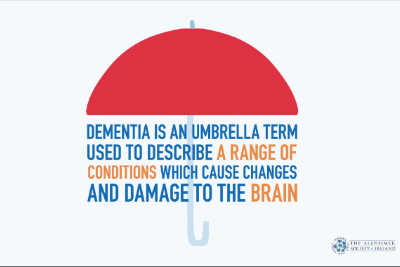What is Dementia?

What is dementia?
Dementia is a physical illness that causes damage to brain cells. This damage means a person’s ability to remember, think, speak and to do everyday things will change. As dementia progresses, the changes become greater, and the person will need more help. There are currently 64,000 people in Ireland living with dementia. There are over 200 different types of dementia. Alzheimer’s disease is the most common type of dementia. For more information on Alzheimer’s disease click HERE . Vascular dementia is the 2nd most common type. you can find more information on Vascular dementia HERE . Lewy body accounts for 10-25% of dementia in Ireland. For more information on Lewy body dementia, click HERE . Frontotemporal dementia accounts for around 10-15% of cases in Ireland. Fore more information on Frontotemporal dementia click HERE . There are other rarer forms of dementia including Korsakoff’s syndrome, Huntington’s disease, Posterior cortical atrophy (PCA) Progressive supranuclear palsy (PSP)
How does dementia progress?
Each person’s experience with dementia is unique. Not every person will experience all the signs and symptoms of their type of dementia. Other illness or health care issues can occur. As a result, how the disease will progress varies from one person to another. Dementia may last many years, sometimes progressing faster, sometimes more slowly. This means that it is not possible for anyone to tell you exactly how the disease of your loved one will progress and how long they will live with dementia. Many people find it stressful that they do not have answers to these questions and that is normal. Understanding as much as you can about dementia will help.
Early Stages
In the early stages of dementia changes are slight – the person with dementia may forget things easily or repeat things frequently. The person may behave in ways that seem odd or different. They may have some problems with language, and may appear to be stuck for words or lose track of what they have been saying, and they may find new situations or places confusing. The person usually looks well and continues to do lots of things they usually did. They may be aware that something is wrong or different, and may be anxious, frustrated and even angry as a result. They may become withdrawn and can become depressed. Some
people lose interest in their appearance or in things they once enjoyed. Others continue to engage in activities they enjoy but may find it hard at times
Middle Stages
As dementia progresses, changes become greater and the person will need more help. The person’s memory generally
gets worse and changes in behaviour may be more difficult to understand and to live with. The person can look well and at times appear well, but more and more they find everyday activities harder to complete. They can be withdrawn, seem pre-occupied and become frustrated. This can be hard for family members and friends to understand and to cope with. There are ways of
coping and this book will guide you to where you can go to get practical and emotional support. It is also important to know that some symptoms occur for a period of time and then go away. For example a person who becomes very upset or very angry easily may, after some time, become calm. Many people with mild and moderate dementia can engage in lots of different activities, with support. We have resources available on Activities which are available to download from our website, or you contact our National Helpline on 1800 341 341 and we can post these out to you. The Alzheimer Society of Ireland also have day-care and day-care at home which allows the person living with dementia to engage in dementia specific activities in a social environment or at home. For more information, contact our National Helpline on 1800 341 341 or you can email [email protected]
Later Stages
Later stages. In the later stages of dementia, a person is no longer able to do things on their own. They may not be able to use words, recognise close family members or move independently. They will need constant care. During this stage the person’s ability to fight even simple infections is low and so, sadly, the illness may eventually be fatal. However, many people with dementia are older when they develop the illness and because it is, in the main, a gradual, progressive illness, many people die of completely unconnected causes.
“In the early years of her illness mum recognised me as her daughter and she recognised her home and we lived reasonably well with Alzheimer’s.....it was still possible for her to enjoy life”
Anonymous

